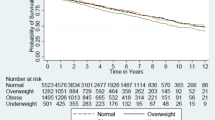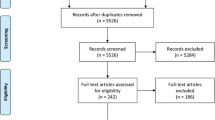Abstract
Introduction
We assessed the effect of recipient body mass index (BMI) on the outcomes of renal transplantation and the management of obese patients with end-stage renal disease across the UK.
Methods
We analyzed data of 25539 adult renal transplants (2007–2016) from the UK Transplant Registry. Patients were divided in BMI groups [underweight: < 18.5, normal: 18.5–24.9 (reference group), overweight: 25–29.9, class I obese: 30–34.9, class II/III obese: ≥ 35]. We also conducted a national survey of all UK renal transplant centers on the influence of BMI on decisions regarding management of renal transplant candidates.
Results
BMI ≥ 25 was an independent risk factor for delayed graft function and primary non-function (p ≤ 0.001). Underweight (p = 0.001), class I obese (p = 0.017) and class II/III obese recipients (p < 0.001) had poorer graft survival, however, 5- and 10-year graft survival rates were good. Patient survival was shorter for underweight recipients (p < 0.001) and longer for overweight (p = 0.028) and class I obese recipients (p = 0.013). The national survey revealed significant variability among transplant centers in BMI threshold for listing patients on transplant waiting list and limited support with conservative or surgical procedures for weight control.
Conclusions
Obesity alone should not be a barrier for renal transplantation. A national strategy is required to give all patients equal chances in transplantation.


Similar content being viewed by others
References
Stommel M, Schoenborn CA (2010) Variations in BMI and prevalence of health risks in diverse racial and ethnic populations. Obesity (Silver Spring) 18:1821–1826
Swinburn B, Vandevijvere S (2016) WHO report on ending childhood obesity echoes earlier recommendations. Public Health Nutr 19:1–2
Potluri K, Hou S (2010) Obesity in kidney transplant recipients and candidates. Am J Kidney Dis 56:143–156
Cannon RM, Jones CM, Hughes MG, Eng M, Marvin MR (2013) The impact of recipient obesity on outcomes after renal transplantation. Ann Surg 257:978–984
Pieloch D, Dombrovskiy V, Osband AJ, Lebowitz J, Laskow DA (2014) Morbid obesity is not an independent predictor of graft failure or patient mortality after kidney transplantation. J Ren Nutr 24:50–57
Gusukuma LW, Harada KM, Baptista AP et al (2014) Outcomes in obese kidney transplant recipients. Transplant Proc 46:3416–3419
Krishnan N, Higgins R, Short A et al (2015) Kidney transplantation significantly improves patient and graft survival irrespective of BMI: a cohort study. Am J Transplant 15:2378–2386
Naik AS, Sakhuja A, Cibrik DM, Ojo AO, Samaniego-Picota MD, Lentine KL (2016) The impact of obesity on allograft failure after kidney transplantation: a competing risks analysis. Transplantation 100:1963–1969
Kwan JM, Hajjiri Z, Metwally A, Finn PW, Perkins DL (2016) Effect of the obesity epidemic on kidney transplantation: obesity is independent of diabetes as a risk factor for adverse renal transplant outcomes. PLoS One 11:e0165712
Pruthi R, Tonkin-Crine S, Calestani M et al (2018) Variation in practice patterns for listing patients for renal transplantation in the United Kingdom: a national survey. Transplantation 102:961–968
Tonkin-Crine S, Pruthi R, Taylor DM et al (2018) Assessing consensus between UK renal clinicians on listing for kidney transplantation: a modified Delphi study. Transplant Direct 4:e343
Johnson RJ, Fuggle SV, Mumford L, Bradley JA, Forsythe JL, Rudge CJ (2010) A New UK 2006 National Kidney Allocation Scheme for deceased heart-beating donor kidneys. Transplantation 89:387–394
Lafranca JA, IJermans JN, Betjes MG, Dor FJ (2015) Body mass index and outcome in renal transplant recipients: a systematic review and meta-analysis. BMC Med 13:111
Hill CJ, Courtney AE, Cardwell CR et al (2015) Recipient obesity and outcomes after kidney transplantation: a systematic review and meta-analysis. Nephrol Dial Transplant 30:1403–1411
Sood A, Hakim DN, Hakim NS (2016) Consequences of recipient obesity on postoperative outcomes in a renal transplant: a systematic review and meta-analysis. Exp Clin Transplant 14:121–128
Nicoletto BB, Fonseca NK, Manfro RC, Gonçalves LF, Leitão CB, Souza GC (2014) Effects of obesity on kidney transplantation outcomes: a systematic review and meta-analysis. Transplantation 98:167–176
Bhaskaran K, Dos-Santos-Silva I, Leon DA, Douglas IJ, Smeeth L (2018) Association of BMI with overall and cause-specific mortality: a population-based cohort study of 3.6 million adults in the UK. Lancet Diabetes Endocrinol 6:944–953
Ahmadi SF, Zahmatkesh G, Streja E et al (2014) Body mass index and mortality in kidney transplant recipients: a systematic review and meta-analysis. Am J Nephrol 40:315–324
Pelletier SJ, Maraschio MA, Schaubel DE et al (2003) Survival benefit of kidney and liver transplantation for obese patients on the waiting list. Clin Transpl 2003:77–88
Tsai A, Schumann R (2016) Morbid obesity and perioperative complications. Curr Opin Anaesthesiol 29:103–108
Baboolal K, McEwan P, Sondhi S, Spiewanowski P, Wechowski J, Wilson K (2008) The cost of renal dialysis in a UK setting—a multicentre study. Nephrol Dial Transplant 23:1982–1989
Treharne C, Liu FX, Arici M, Crowe L, Farooqui U (2014) Peritoneal dialysis and in-centre haemodialysis: a cost-utility analysis from a UK payer perspective. Appl Health Econ Health Policy 12:409–420
Muduma G, Shaw J, Hart WM, Odeyemi A, Odeyemi I (2014) Cost utility analysis of immunosuppressive regimens in adult renal transplant recipients in England and Wales. Patient Prefer Adherence 8:1537–1546
Oberholzer J, Giulianotti P, Danielson KK et al (2013) Minimally invasive robotic kidney transplantation for obese patients previously denied access to transplantation. Am J Transplant 13:721–728
Lesage J, Gill JS (2017) Management of the obese kidney transplant candidate. Transplant Rev (Orlando) 31:35–41
Miles Maliska C, Jennings W, Mallios A (2015) When arteriovenous fistulas are too deep: options in obese individuals. J Am Coll Surg 221:1067–1072
Acknowledgements
We would like to thank Ms Lisa Mumford for her valuable assistance in providing the data from NHSBT and her useful comments on their analysis.
Author information
Authors and Affiliations
Contributions
IDK and TK: Literature search, study design, data analysis and interpretation, manuscript preparation and revision; VB: Literature search, data analysis and interpretation, manuscript preparation; PP: Study design, data analysis and interpretation, manuscript preparation; CF: Data analysis and interpretation, manuscript revision; CC, BP, NKa, NK: Literature search, data interpretation, manuscript revision; FC: Literature search, study design, data analysis and interpretation, manuscript revision; IL: Literature search, study design, data analysis and interpretation, manuscript preparation and revision.
Corresponding author
Ethics declarations
Conflict of interest
All the authors declare that there is no financial support from any organisation for the submitted work, no financial relationships with any organisations that might have an interest in the submitted work and no other relationships or activities that could appear to have influenced the submitted work. All the authors declare that there are no conflicts of interest.
Research involving human participants
Our study conforms to the 2000 Declaration of Helsinki and the 2008 Declaration of Istanbul.
Informed consent
Not applicable. Retrospective study based on the UK Transplant Registry of NHSBT.
Additional information
Publisher's Note
Springer Nature remains neutral with regard to jurisdictional claims in published maps and institutional affiliations.
Rights and permissions
About this article
Cite this article
Kostakis, I.D., Kassimatis, T., Bianchi, V. et al. UK renal transplant outcomes in low and high BMI recipients: the need for a national policy. J Nephrol 33, 371–381 (2020). https://doi.org/10.1007/s40620-019-00654-7
Received:
Accepted:
Published:
Issue Date:
DOI: https://doi.org/10.1007/s40620-019-00654-7




